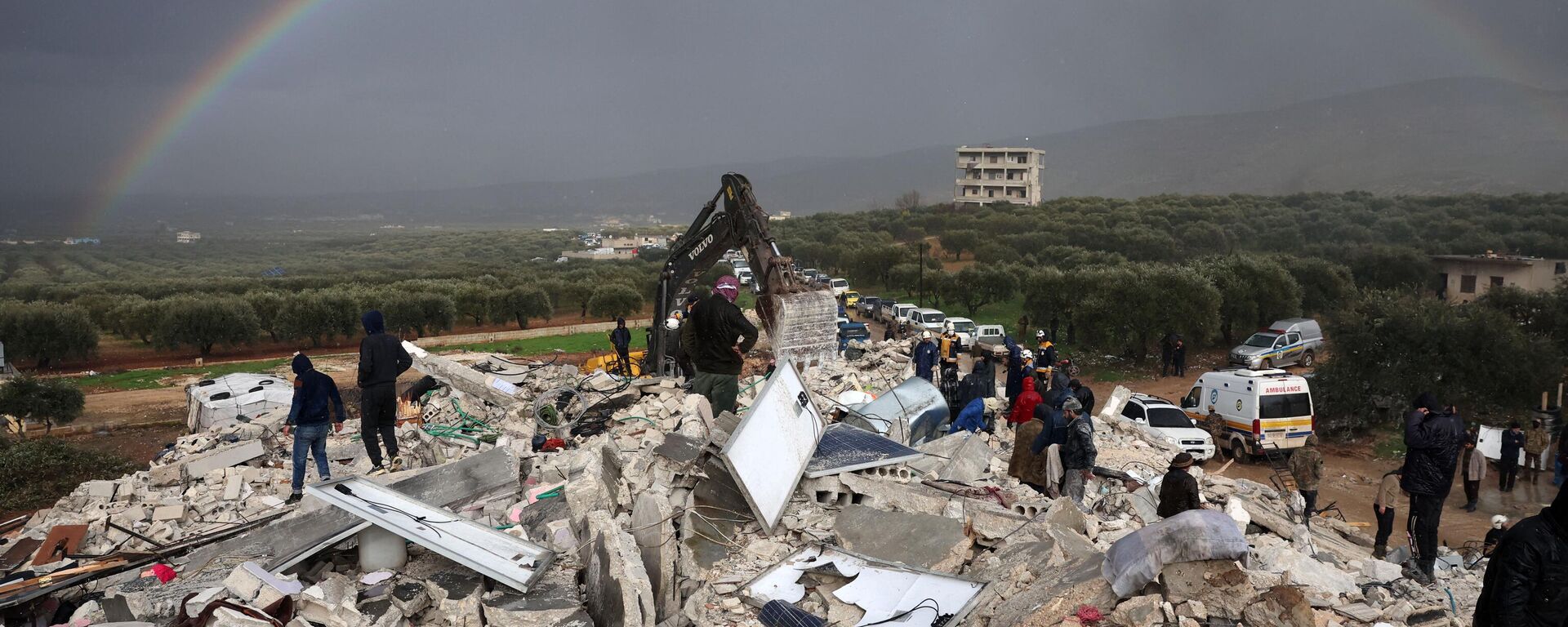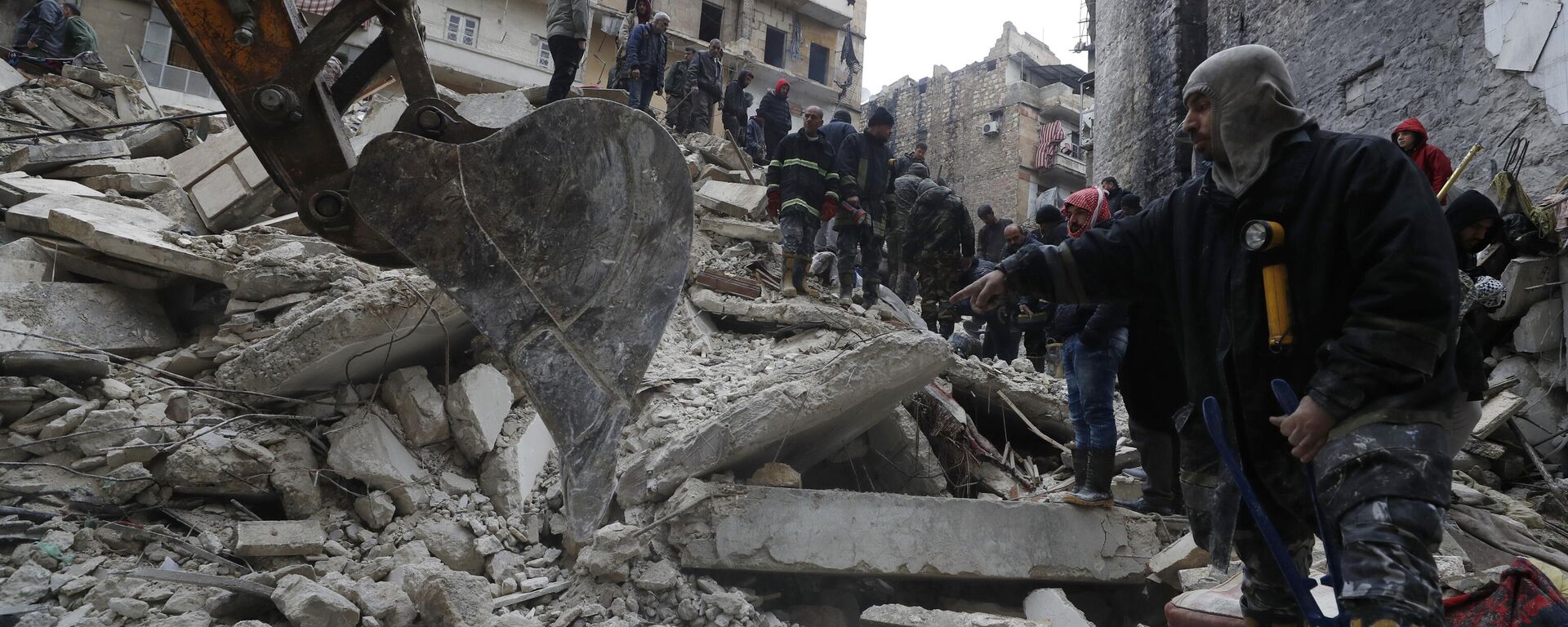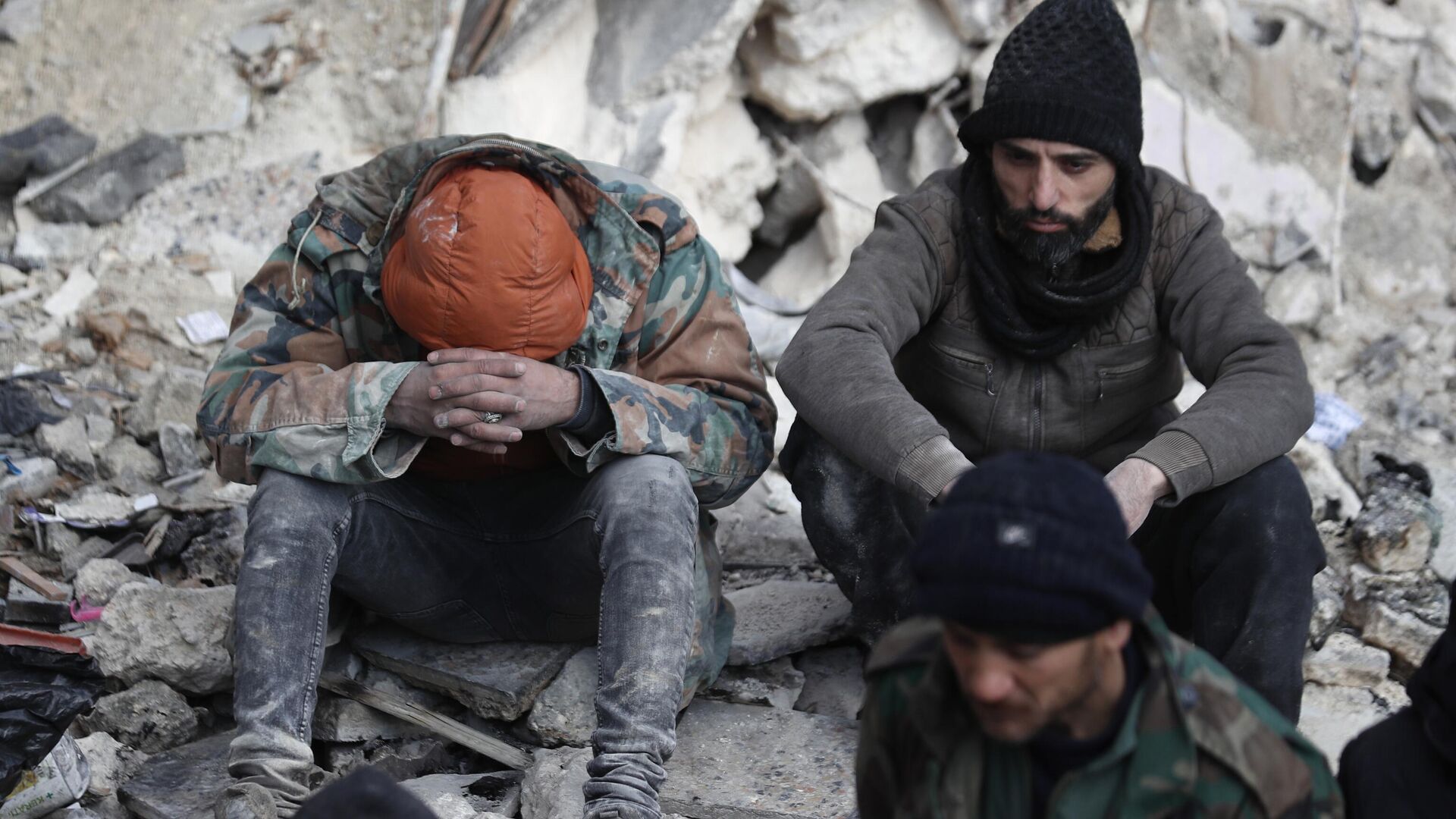https://sputnikglobe.com/20230208/sanctions-theft-pressure-west-refuses-to-stop-tormenting-syrians-despite-quake--war-damage-1107080946.html
Sanctions, Theft, Pressure: West Refuses to Stop Tormenting Syrians Despite Quake & War Damage
Sanctions, Theft, Pressure: West Refuses to Stop Tormenting Syrians Despite Quake & War Damage
Sputnik International
On February 6, northern Syria was hit by a series of earthquakes reaching 7.8 on the Richter scale. The natural disaster killed over 2,000 Syrians and injured many more, amplifying the sufferings of the war-torn nation which has also borne a heavy burden of Western sanctions for years.
2023-02-08T14:26+0000
2023-02-08T14:26+0000
2023-02-09T13:08+0000
analysis
syria
middle east
us
opinion
aleppo
humanitarian aid
us sanctions
caesar syrian civilian protection act
syrian democratic forces (sdf)
https://cdn1.img.sputnikglobe.com/img/07e7/02/08/1107068612_0:160:3072:1888_1920x0_80_0_0_fa60389cfca16222c3333b80567ab022.jpg
"This is going to just be more pain for the Syrian people, as I witnessed in Syria - many of the towns in Syria are still not rebuilt after the war. Many of the towns you'll go through you just see devastation, buildings that have crumbled, debris that hadn't even been taken away," Dan Kovalik, an adjunct professor of international human rights at the University of Pittsburgh School of Law told Sputnik.In the aftermath of the natural disaster, the Biden administration expressed its "deepest condolences" to the Syrians, but ruled out lifting the 2019 Caesar Act, a set of punitive measures suffocating the Arab Republic's economy. The sanctions package adopted by the Trump administration in 2019 blocked imports of essential goods like food, energy, and basic medical supplies and equipment to the country.To complicate matters further, the US-backed Syrian Democratic Forces (SDF) and their Western patrons are continuing their illegal occupation of Syria's oil fields, thus crippling the economy even further. The US and its NATO allies claim that the measures are aimed at punishing the legitimately elected government of Bashar al-Assad, whom Western governments and their proxies have been failing to topple for the past 12 years. Syria is one of the most heavily sanctioned nations in the world, with over 2,600 sanctions currently in place against the country by the US and its allies.Kovalik recollected that when he visited the Syrian Arab Republic, "people have about two hours of energy a day," which is still the case there. He emphasized that with that little energy, there's no way to make the materials necessary to rebuild.Speaking to Sputnik in October 2020, Dr. Ibrahim Alloush, economist and lecturer at the University of Damascus, noted that the US had been methodically ruining the Syrian economy for decades. He pointed out that Washington adhered to this ploy in the late 1970s, with a gradual tightening of sanctions on Syria over the decades. The US' illicit occupation of the country has led to severe energy shortages. Oil and gas are especially important, being used in sectors such as transportation, generating electricity, manufacturing, agriculture, etc.In addition, as a food crisis was unfolding last year, the US stepped up smuggling Syrian wheat from illegally occupied regions. Prior to the civil war, Syria had been the only Arab country that was self-sufficient in wheat and had a surplus to export, as Basma Qaddour, a Syrian journalist and co-author of "Voices from Syria," told Sputnik in May 2022. According to her, the US-backed SDF have grabbed and sold Syrian grain over the past years in coordination with the US military. What's more, US-led coalition forces burnt Syrian crops in order to raise the commodity’s purchasing price and force farmers into selling grain, according to her.Washington Deprives Syrians of Aid & ChoiceWashington made it clear that it would not provide humanitarian aid to Damascus in the wake of the quakes, but would be working with "NGO partners on the ground," not elaborating on who these "partners on the ground" are exactly and when precisely the much-needed help would arrive.Meanwhile, many states have not extended their helping hand to the Arab Republic so far, either, as they are afraid of sanctions, according to Elijah Magnier, veteran war correspondent."Only a few countries, six or seven countries like Russia, China, Iran, Iraq, Algeria, Tunisia and the Emirates, rushed to help Syria," Magnier told Sputnik. "The problem is all the other countries feel afraid of the American sanctions because they were told that any flight that landed in Damascus means a violation of the US and EU sanctions."Western countries have so far failed to provide aid not only to Syrians living in the areas controlled by the government, but also to those under the control of jihadists and Syrian rebels, according to the war correspondent.Furthermore, the Syrian government is not able to help refugees living in the US-controlled al-Tanf zone, according to him.The West's Syria strategy and attitude to the population of the Middle Eastern country is mind-boggling, according to the veteran war correspondent. It's unclear what the exact goals the US and its NATO allies want to reach in the Middle East are, given that their sanctions policy has failed a myriad of times, he noted, adding that it has not worked when it comes to Iran, nor has it worked in Russia."The sanctions against Iran have not changed anything in 43 years since 1979, and the sanctions against Syria since 2019 will not change anything," he remarked.The US doctrine in a nutshell is to break the population's legs and arms to force them into turning against their rulers, the correspondent noted. However, it does not work like that.
https://sputnikglobe.com/20201030/us-is-methodically-ruining-syrian-economy-but-damascus-has-tools-to-avert-the-pressure-prof-says-1080917918.html
https://sputnikglobe.com/20230207/us-cries-crocodile-tears-about-quakes-impact-on-syria-while-keeping-crushing-sanctions-in-place-1107048120.html
https://sputnikglobe.com/20230208/aftermath-of-deadly-earthquakes-in-syrias-aleppo-1107065460.html
syria
aleppo
Sputnik International
feedback@sputniknews.com
+74956456601
MIA „Rossiya Segodnya“
2023
News
en_EN
Sputnik International
feedback@sputniknews.com
+74956456601
MIA „Rossiya Segodnya“
Elijah Magnier: Only Few Countries Rushed to Help Syria After Earthequake, Others Were Afraid of US Sanctions
Sputnik International
Elijah Magnier: Only Few Countries Rushed to Help Syria After Earthequake, Others Were Afraid of US Sanctions
2023-02-08T14:26+0000
true
PT3M25S
Elijah Magnier: Syria is Really Suffering From Sanctions
Sputnik International
Elijah Magnier: Syria is Really Suffering From Sanctions
2023-02-08T14:26+0000
true
PT2M43S
Sputnik International
feedback@sputniknews.com
+74956456601
MIA „Rossiya Segodnya“
syria earthquake, humanitarian aid for syria, us sanctions against syria, the 2019 caesar act, theft of syrian oil, illegal occupation of syria by the us, us smuggling syrian grain, syrian economy
syria earthquake, humanitarian aid for syria, us sanctions against syria, the 2019 caesar act, theft of syrian oil, illegal occupation of syria by the us, us smuggling syrian grain, syrian economy
Sanctions, Theft, Pressure: West Refuses to Stop Tormenting Syrians Despite Quake & War Damage
14:26 GMT 08.02.2023 (Updated: 13:08 GMT 09.02.2023) On February 6, northern Syria was hit by a series of earthquakes reaching 7.8 on the Richter scale. The natural disaster killed over 2,000 Syrians and injured many more, amplifying the suffering of the war-torn nation, which has also borne a heavy burden of Western sanctions for years.
"This is going to just be more pain for the Syrian people, as I witnessed in Syria - many of the towns in Syria are still not rebuilt after the war. Many of the towns you'll go through you just see devastation, buildings that have crumbled, debris that hadn't even been taken away,"
Dan Kovalik, an adjunct professor of international human rights at the University of Pittsburgh School of Law
told Sputnik.
In the aftermath of the natural disaster, the Biden administration expressed its "deepest condolences" to the Syrians, but ruled out lifting the 2019 Caesar Act, a set of punitive measures suffocating the Arab Republic's economy. The sanctions package adopted by the Trump administration in 2019 blocked imports of essential goods like food, energy, and basic medical supplies and equipment to the country.
To complicate matters further, the US-backed Syrian Democratic Forces (SDF) and their Western patrons are continuing their illegal occupation of Syria's oil fields, thus crippling the economy even further. The US and its NATO allies claim that the measures are aimed at punishing the legitimately elected government of Bashar al-Assad, whom Western governments and their proxies have been failing to topple for the past 12 years. Syria is one of the most heavily sanctioned nations in the world, with over 2,600 sanctions currently in place against the country by the US and its allies.
"What people need to understand is a lot of these buildings in these towns are made of concrete, to make concrete is a very energy demanding thing, and one of the things Syria doesn't have now because of the sanctions and because of the US occupation of one third of Syria. While it's an oil rich country, the United States controls 80% of Syria's oil because of its occupation. And the US is actually stealing billions of dollars of Syrian oil, which is a war crime. They are plundering Syria of its oil," said Kovalik, who is also the author of “No More War: How the West Violates International Law by Using 'Humanitarian' Intervention to Advance Economic and Strategic Interests.”

30 October 2020, 04:15 GMT
Kovalik recollected that when he visited the Syrian Arab Republic, "people have about two hours of energy a day," which is still the case there. He emphasized that with that little energy, there's no way to make the materials necessary to rebuild.
"So, you already have a country devastated by the war. And now you're going to have a country devastated by the earthquake. And reconstruction will be very difficult, if possible at all," he summarized.
Speaking to Sputnik in October 2020, Dr. Ibrahim Alloush, economist and lecturer at the University of Damascus, noted that
the US had been methodically ruining the Syrian economy for decades. He pointed out that Washington adhered to this ploy in the late 1970s, with a gradual tightening of sanctions on Syria over the decades. The US' illicit occupation of the country has led to severe energy shortages. Oil and gas are especially important, being used in sectors such as transportation, generating electricity, manufacturing, agriculture, etc.
In addition, as a food crisis was unfolding last year, the US stepped up smuggling Syrian wheat from illegally occupied regions. Prior to the civil war, Syria had been the only Arab country that was self-sufficient in wheat and had a surplus to export, as Basma Qaddour, a Syrian journalist and co-author of
"Voices from Syria," told Sputnik in May 2022. According to her, the US-backed SDF have grabbed and sold Syrian grain over the past years in coordination with the US military. What's more, US-led coalition forces burnt Syrian crops in order to raise the commodity’s purchasing price and force farmers into selling grain, according to her.

7 February 2023, 15:27 GMT
Washington Deprives Syrians of Aid & Choice
Washington made it clear that it would not provide humanitarian aid to Damascus in the wake of the quakes, but would be working with "NGO partners on the ground," not elaborating on who these "partners on the ground" are exactly and when precisely the much-needed help would arrive.
Meanwhile, many states have not extended their helping hand to the Arab Republic so far, either, as they are afraid of sanctions, according to Elijah Magnier, veteran war correspondent.
"Only a few countries, six or seven countries like Russia, China, Iran, Iraq, Algeria, Tunisia and the Emirates, rushed to help Syria," Magnier
told Sputnik. "The problem is all the other countries feel afraid of the American sanctions because they were told that any flight that landed in Damascus means a violation of the US and EU sanctions."
Western countries have so far failed to provide aid not only to Syrians living in the areas controlled by the government, but also to those under the control of jihadists and Syrian rebels, according to the war correspondent.
"All the friends of Syria that pretend to be the friends of Syria, i.e. Europe and the United States, are not helping the Syrian even in the area under the rebel and jihadist control," Magnier said. "So what we have here in Syria, we have very bad weather, we have the snow, have only Iran that is supplying Syria with oil once a month and that is not enough for the necessity and the need of the country, because the real source of oil comes from northeast Syria that is occupied by the Americans."

8 February 2023, 08:05 GMT
Furthermore, the Syrian government is not able to help refugees living in the US-controlled al-Tanf zone, according to him.
"[Damascus] doesn't have the possibility to export food to Jordan, Saudi Arabia and the Emirati and other Gulf countries because there are harsh US-EU sanctions," the journalist said. "The food basket is again in the northeast [of the country] which is under the control of the Americans. So, all of that, it makes the government of Syria hardly able to maintain paying some salaries and able to look after the population and certainly cannot reconstruct the country and reconstruct the 70% of the area under the control of the government. It is impossible to go and look at those who are living in tents, who are [living] without water, without electricity."
The West's Syria strategy and attitude to the population of the Middle Eastern country is mind-boggling, according to the veteran war correspondent. It's unclear what the exact goals the US and its NATO allies want to reach in the Middle East are, given that their sanctions policy has failed a myriad of times, he noted, adding that it has not worked when it comes to Iran, nor has it worked in Russia.
"The sanctions against Iran have not changed anything in 43 years since 1979, and the sanctions against Syria since 2019 will not change anything," he remarked.
The US doctrine in a nutshell is to break the population's legs and arms to force them into turning against their rulers, the correspondent noted. However, it does not work like that.
"I am a war correspondent. I lived in more than a dozen wars and I can tell you, people turn into their survival mode. They turn to how they are going to buy the bread, how are they going to buy gasoline? And they don't give a damn about the politics because they will not turn against the leader and say 'It is all your fault!' They will say these people are allowing us to starve, watching us, not supporting us," Magnier concluded.





